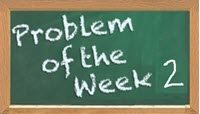P.o.t.W. #2
 Problem of the Week #2
Problem of the Week #2
■ GDC is allowed ■
The rules for a lottery are as follows. Each lottery ticket costs $10. When a person purchases a lottery ticket they select five different numbers from 1 to 12 inclusive. For example, a set of numbers on a ticket could be the numbers 1, 4, 7, 10 and 12. When the lottery comes to an end, five different numbers from 1 to 12 are randomly chosen as the ‘winning’ set of numbers. If the five different numbers on a ticket match three of the winning numbers then the ticket-holder receives $20; if the numbers on a ticket match four of the winning numbers then the ticket-holder receives $40; and if all five of the numbers match then the ticket-holder receives $60.
(a) How many ways can five different numbers be chosen from the numbers 1 to 12?
(b) Sophie purchase one lottery ticket that costs $10. What is the probability that Sophie:
(i) matches three of the winning numbers and receives $20;
(ii) matches four of the winning numbers and receives $40;
(iii) matches five of the winning numbers and receives $60.
(c) For the one lottery ticket that Sophie purchased, calculate Sophie’s expected gain or loss.
(d) Consider that the cost of a lottery ticket is changed to \(x\) dollars per ticket. Find the value of \(x\) (accurate to three significant figures) so that playing the lottery is a ‘fair’ game; that is, the expected gain/loss is zero.
downloadable file: P.o.t.W. #2

 IB Docs (2) Team
IB Docs (2) Team
